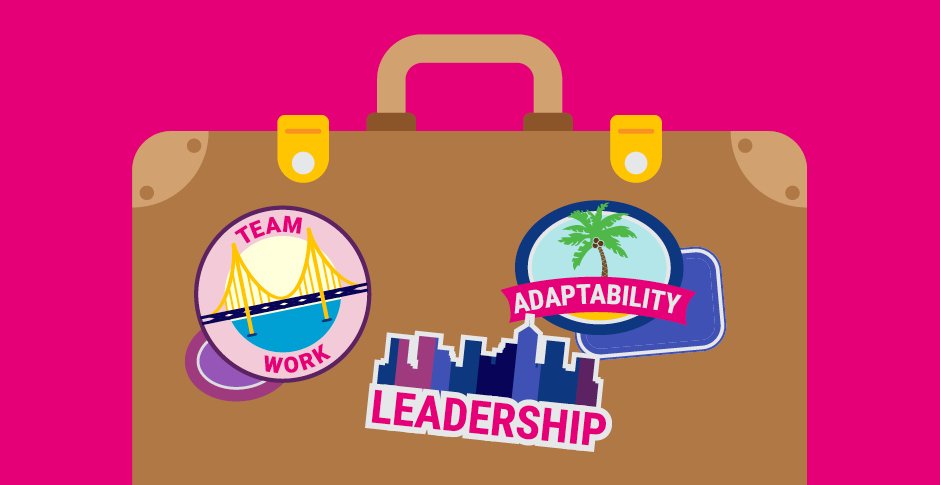How to create a transferable skills resume
If you want to get into a new role or industry, you might find you don’t have much direct experience to help you make the change. Maybe you have to look beyond your own industry for work, or you want to take a leap into something new.
That’s where transferable skills come in – they can help you make that move. Think of your transferable skills as ‘portable skills’ – you can take them with you from one job to another.
Here’s more on what transferable skills are and why they’re so useful, plus tips on how you can base your resume around them.
Why your transferable skills are valuable
Transferable skills are skills and abilities that are useful in almost any role – and you’ve likely got quite a few of them. Organisational skills like time management, communication skills like writing and listening, and people skills like co-operation, leadership and teamwork are all transferable skills.
Because you can use transferable skills across many kinds of work, they can be incredibly valuable in helping you get into a new role or industry. They can also help you stand out during the job application process. Employers value transferable skills because they’re often fundamental skills that are of real benefit to the workplace.
“Every one of us develops transferable skills that can add value to new roles,” says career coach and Asuria Australia CEO, Nicole Grainger-Marsh. “For instance, if you’re a team leader now, then you will have developed skills such as management, team leadership, mentoring – skills that aren’t limited by the sector that you’re in.”
Even if you’re new to the workforce, you may have skills like technology literacy, or traits like flexibility or empathy that you’ve picked up in your life so far.
Transferable skills show that you can adapt
These skills can also demonstrate that you’re someone who can adjust to a new role, working environment or industry.
“The transferable skills that you have are, by their nature, based on your abilities to adapt,” Grainger-Marsh says. “Given the fast pace of change, and the number of different roles the average person is likely to have, the adaptability that your transferable skills can demonstrate is crucial.”
In other words, it’s skills, not always experience, that you need to make a step into a new industry or role.
5 tips for building your resume around transferable skills
If you want to make the most of your transferable skills for entering a new kind of work or industry, making sure that they’re a strong focus in your resume is important.
- Identify your transferable skills. First, it’s important to be clear on what your own transferable skills are so that you can highlight them clearly to potential employers. Refer to this transferable skills checklist to help you identify and list them.
- Look at what’s required for the role or industry. Next, consider what transferable skills could be most relevant to the kind of work you want to do. Then you can refine your list of transferable skills and match them to the jobs you’re applying for.
“Find some examples of the roles being advertised, and make a list of the skills and experience they are looking for,” Grainger-Marsh says. “There will probably be a few common elements in there, and those are the areas to focus on.” If there’s one particular job you’re interested in, read closely over the requirements in the job ad and identify any transferable skills mentioned.
- Write your transferable skills using descriptions and examples. Now focus on your resume itself. A transferable skills-based resume includes all the elements of a typical resume – profile, education, experience and contact information. But it makes your relevant skills more prominent. You might create a section under the title ‘Key skills’ to list your skills and explain how you’ve used them. Or you might include bullet points about your skills under the roles you put in the experience section of your resume.
The easiest way to demonstrate transferable skills is to be descriptive when you write about the environment you’ve been working in, says Natalie Rogers, Executive Consultant at Six Degrees Executive. “This will help the hiring manager to identify whether you will be able to transition into their environment,” she explains.
For example, if you’ve been working in an environment that involves negotiating with other people or teams and this is similar to the new role, that would be a plus in the eyes of the employer.
- Consider the personality traits employers are looking for. More and more, organisations are recognising the importance of getting the right person and not just the right skills,” Grainger-Marsh says. So, it’s also important to look at the personality traits a company or employer is looking for when hiring.
“Do they ask for a ‘self-motivated’ person in several ads? Is an individual with ‘good stakeholder management’ specifically referenced? Those are transferable skills which can help make up ground if one of the technical skills is missing from your list,” Grainger-Marsh says.
“There are also key personality traits that will always be relevant, such as a proactive nature, flexibility, and adaptability,” says Rogers, so add those to your resume too, if you have them.
- Be confident in your ability. It’s good to remember that experience isn’t everything. “Combining the relevant transferable skills and personality traits can see you transition into a new industry, despite a lack of industry experience,” Rogers says. “And be prepared to bring these key skills to life during an interview with strong, real-life examples of how you have successfully demonstrated the skills.”
“If you demonstrate the skills, aptitude and, most importantly, the cultural fit and attitude that will bring success, employers will often respond,” says Grainger-Marsh. After all, she adds, they’re not hiring a resume – they’re hiring a person.
